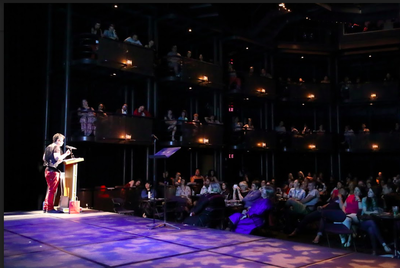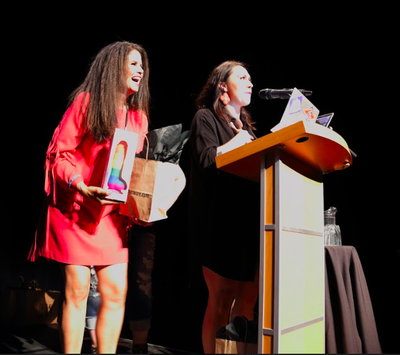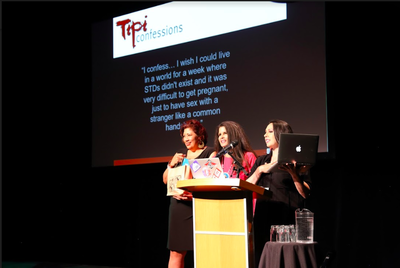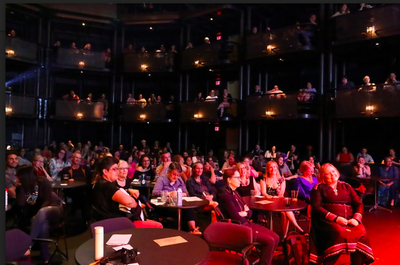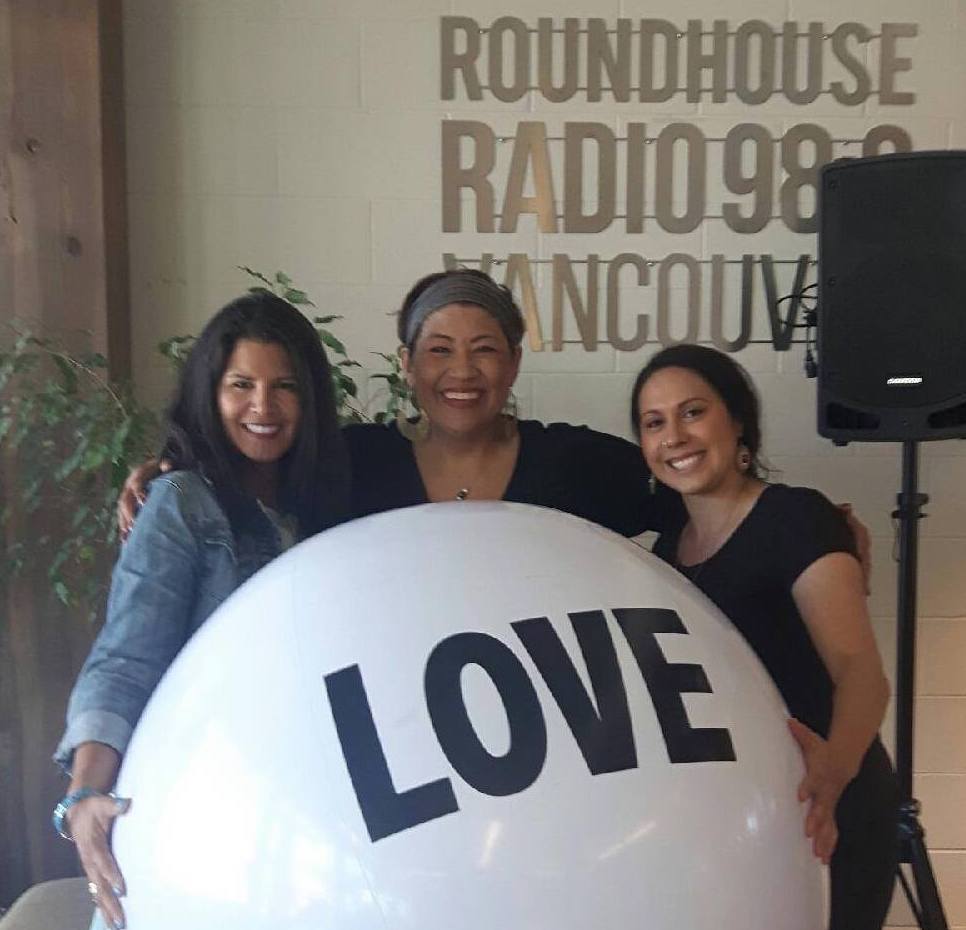Critical polyamorist blog
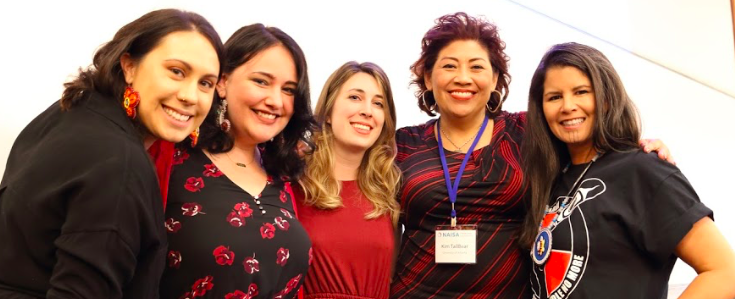 Tipi Confessions NAISA panel: L to R: Kirsten Lindquist, Brittany Johnson, Charlotte Hoelke, Kim TallBear, Tracy Bear (photo: Jun Kamata) Tipi Confessions NAISA panel: L to R: Kirsten Lindquist, Brittany Johnson, Charlotte Hoelke, Kim TallBear, Tracy Bear (photo: Jun Kamata) Critical Poly Note: My academic work and the personal-political work of living a critical polyamorist life are increasingly coming together. They especially intersect in the sexy storytelling show Tipi Confessions that I produce with colleagues from the University of Alberta, Faculty of Native Studies. With a contract and mentorship from the original Bedpost Confessions sexy storytelling show in Austin, Texas and their founding producers, we do Tipi Confessions shows in Edmonton and across Canada. This blog post is a talk that I gave at the Native American and Indigenous Studies Association (NAISA) 2017 Annual Meeting, University of British Columbia, June 24, 2017. In this talk I highlight the creative, academic, and decolonization work that intersect in Tipi Confessions and the research-creation lab we are building around the show. This talk was given under my other moniker, Kim TallBear, Associate Professor and Canada Research Chair in Indigenous Peoples, Technoscience and Environment at the University of Alberta Faculty of Native Studies. In this talk I describe an innovative new community-based research program and creative methodology at the University of Alberta Faculty of Native Studies. Tipi Confessions is comprised of sexually-themed performances that take creative research methodologies to the stage. Please join us at the Chan Centre of Performing Arts here on the UBC campus tonight at 7:30 for our show, which has also appeared with a variety of different performers in Edmonton, Saskatoon, and Ottawa. Three Indigenous women from the University of Alberta—Professors Tracy Bear and Kim TallBear, and social media maven Kirsten Lindquist, with occasional guest producers—produce 3-4 Tipi Confessions shows annually. In addition, Charlotte Hoelke, Indigenous graduate student at Carleton University produces a student-run Tipi Confessions show in Ottawa. Our shows are sometimes associated with academic symposia as is our show this week at NAISA. Tipi Confessions was first held in December 2015 with all Indigenous performers at the University of Alberta Indigenous Masculinities symposium, where we drew a capacity audience of 200 at the Art Gallery of Alberta theatre. We produced our second Edmonton-based show in October 2016 at a Fringe complex theatre to accompany the Prairie Sexualities symposium co-organized by University of Alberta Women & Gender Studies professor Susanne Luhmann in collaboration with feminist scholars from the University of Saskatchewan. We produced our third show this past February 18, 2017 at the University of Saskatchewan in collaboration with OUTSaskatoon. They approached us after seeing our Prairie Confessions show and asked if we could bring the show to Saskatoon as part of the weeklong queer arts and performance festival, Wîsahkêcâhk Comes to Town! With advising from University of Alberta drama faculty—our dramaturge, Professor Donia Mounsef—and with mentoring from the producers of the original Bedpost Confessions™ show in Austin, Texas, Tipi Confessions, Indigenizes the highly successful sexy storytelling and performance format developed in 2010 by three writer/producers--Julie Gillis, Sadie Smythe, and Mia Martina in Austin. In the seven years since, Bedpost Confessions has been a proven performance technology. The quarterly show is heavily attended in Austin—I’ve seen long entrance lines around the venue—and is known in the city for promoting sex positivity via performance, associated workshops, and outreach to diverse constituencies. It is a truly brilliant format and we are grateful that the founders in Austin contracted with us add an Indigenous flavor and to bring the show to Edmonton and other cities across Canada. Our shows solicit from the university and local communities stories and performances focused on sex-positive themes. Stories can be explicitly political, feminist, humorous, and/or educational. Performances fit the Bedpost Confessions™ mission of ethics, education, and entertainment around sex, sexuality, and gender. The show also considers performers who do comedy, video, burlesque, short stage readings, or any performance that features positive sexuality. However, anonymous audience confessions—read on stage by our MCs—are “always the stars of the show,” a Bedpost Confessions tagline. Confessions run the gamut from simply salacious to also hilarious and sometimes moving as our audiences—like many of us—have overcome or are overcoming so much, including sexual trauma. They confess their difficult journeys sometimes towards positive sexuality after the shame and trauma rendered especially via colonial suppression of Indigenous sexualities. We will soon call for submissions for a Halloween 2017 show to be held again at the Fringe Theatre complex in Edmonton. Our aim is to produce Tipi Confessions as a triannual (fall, winter, spring,) show in Edmonton in addition to producing shows to accompany academic symposia when an irresistible opportunity arises. We have found that it is considerably more work and sometimes more expensive to take this show on the road largely because of having to deal with new and less familiar social and organizational networks, and new theatre venues and processes that risk unexpected costs. But we learn as we go. A point to emphasize: While we are Indigenous-women led and thus we center Indigenous analytical and ethical frameworks, especially prairie-Indigenous histories, cultures, languages, and sensuous topographies, we are inclusive of other Indigenous and non-Indigenous performers in most of our shows. The producers decided early on that we would invite many diverse people into our tipi while still centering our standpoints. We solicit works from Indigenous and non-Indigenous artists and writers. We invite a diverse array of performers into our metaphorical tipi. And as two-spirit Cree elder Marjorie Beaucage from Saskatoon said at the show there, “tipis have no closets."
The Research-Creation Approach Tipi Confessions serves as the anchor of a “research-creation laboratory,” a space of creative experimentation and action research co-produced with our existing decolonial and critical sexualities research and curriculum in the Faculty of Native Studies at the University of Alberta. You’ll hear more about these activities from Tracy Bear and others later on this panel. Tracy teaches the very popular Indigenous Erotica course at the University of Alberta. And I teach a course, (De)Colonial Sexualities that works to disaggregate both the concepts of “nature” and “sex” back into “relations” thus decolonizing or even displacing those terms. I seek to demonstrate in my work that so-called sex and nature are not fundamental ways to organize world or the variety of bodies that inhabit it. And I think “sex” and “nature” are unfortunate translations for many Indigenous peoples of the ways in which we relate to both our human intimates and our other-than-human loves, including the land- and waterscapes of our hearts. Tipi Confessions offers University of Alberta faculty, students, and staff as well as students and researchers at other universities (e.g. at Carleton University under the direction of Charlotte Hoelke with mentoring also from Bedpost Confessions) an experimental space in which to combine performance with research in the humanities and social sciences. How do we do that, and what is the research-creation approach, specifically? Chapman and Sawchuk in their 2012 article on research-creation explain: Research-creation…projects typically integrate a creative process, experimental aesthetic components, or an artistic work as an integral part of the study. Topics are selected ad investigated that could not be addressed without engaging in some form of creative practice, such as the production of a video, performance, film, sound work, blog or multimedia text. While works may be exhibited or performed as “art” and research-creation is occurring in a wide-range of cultural institutions and disciplines, the focus of this article is how this practice act as an epistemological intervention into the “regime of truth” of the university. Universities and other degree-granting institutions have firmly established protocols and practices for what constitutes valid scholarship that act as normative frameworks for modes of presentation. Research-creation can thus be read as a methodological and epistemological challenge to the argumentative form(s) that have typified much academic scholarship. In research-creation approaches the theoretical, technical, and creative aspects of a research project are pursued in tandem, and quite often, scholarly form and decorum are broached and breeched in the name of experimentation. I have also broached and breeched scholarly decorum in my social science-meets-Indigenous-planner work and the way that I have approached my anthropology of science work. As a feminist researcher, I found that I had to care for my subject. My book Native American DNA: Tribal Belonging and the False Promise of Genetic Science turned the gaze back onto largely white, heterosexual, males—those who usually find it their prerogative to gaze at us. However, not caring for my subjects—indeed wanting their research projects and worldview to fail—was a demoralizing form of research while also constituting an important challenge to their colonial research regime. But the former planner in me conceived of another way to also work that addressed that predicament. I began to work with critical non-Indigenous scientists and the very few Indigenous scientists I could find to train and mentor young Indigenous scientists who were still students. I work with scientists who founded the Summer Internship for Indigenous Peoples in Genomics (SING), an annual summer training and networking program with both wet lab and dry lab (or decolonial bioethics) components. I wanted to help change science from within. I could not have done this work as a legitimate complement to my anthropology that gazes at a subject population’s curious cultural practices if I held fast to the misguided ship of standard notions of objectivity that purport to gaze and study from a so-called distance. Rather, I practice feminist objectivity and Indigenous standpoint that is highly self-reflexive about the historic, geographic, and bodily grounds from which I am rooted when I ask my particular research questions. I do not delude myself like so many weak objectivity thinkers that I gaze from nowhere. But to return to Tipi Confessions and research-creation, this methodology and concept provides our research group and production team a particularly moving and productive path to generate performances—creative works that are pleasurable, healing, and transformative—while also attending to histories and ongoing social dynamics of colonization and decolonization. Research-creation and the project of Tipi Confessions and the broader Decolonial Sex and Sustainability Lab (DSSL) are ground in appeals to my planner’s sensibility. We research and perform for social change. And in Tipi Confessions, the transformation sparks within the 2-hour timespan of the show. In summary, the research-creation approach helps us to transcend university walls as we engage artists, performers, activists, and community members in Edmonton and across Canada in the active work of decolonizing sexualities and sex practices—Indigenous and not. That is the broader context. Let me now provide a few more details about what our lab is organizing in terms of academic programming. The Decolonial Sex and Sustainability Laboratory: Reconstituting Relations The mission of the Decolonial Sex and Sustainability Laboratory (DSSL) will be to articulate theories, social science, and creative action-research outputs that help envision new and re-envision old models of sustainable relations between humans and with our other-than-human relations, be those nonhuman animals, waters, and land upon which we depend as human communities. Unsustainability is not only an artifact of humans using too many resources of “nature,” e.g. harvesting too many trees, fish, and other animal bodies, pulling fossil fuels out of the ground in ever-dangerous and contaminating ways, and using fossil resources to fuel unsustainable agricultural systems and growth economies. We can also understand social relations between humans as unsustainable, as both materially and socially resource intensive with the costs and benefits unevenly distributed. The same hierarchies of life or hierarchies of organisms that enable human domination of nonhuman animals and the environment have enabled racial domination of European (Americans) over Indigenous people and other “visible minorities” or “people of color.” Those hierarchies of life also enable male domination and de-animation (making less alive or vital) of women and other genders. They enable the domination of disabled bodies, queer bodies, and other non-normative humans. Social and cultural development that also always involves economic and institutional development has come disproportionately at the expense of the marginalized and disproportionately shores up the wealth—both material and social—of the privileged. Unsustainable sexual relations are also key to the resource-intensive, private property settler-colonial regime that our laboratory will work to intervene in. The DSSL will undertake several intersecting initiatives that I will list only briefly. I don’t want this talk to end like a grant proposal:
Below is a photo of the three Tipi Confessions producers after our interview (along with Bedpost Confessions' producer Julie Gillis) with the academic broadcaster, Minelle Mahtani, on her Sense of Place weekday show on Vancouver's Roundhouse Radio 98.3 . You can listen to the hour-long interview here. Acknowledgements: Thanks to our show photographer, Jun Kamata, photographer, writer, and Professor at Asia University, Tokyo. Thanks also to our sponsors for the Vancouver Tipi Confessions show at the Chan Centre for Performing Arts: Womyn's Ware for sexy prizes for audience members and to YouthCO and QMUNITY for condoms and lube distributed free to audience members. Pleasurable, consensual, and safe sex!
0 Comments
Your comment will be posted after it is approved.
Leave a Reply. |
Photo credit: Short Skirts and Cowgirl Boots by David Hensley
The Critical Polyamorist, AKA Kim TallBear, blogs & tweets about indigenous, racial, and cultural politics related to open non-monogamy. She is a prairie loving, big sky woman. She lives south of the Arctic Circle, in Edmonton, Alberta, Canada. You can follow her on Twitter @CriticalPoly & @KimTallBear
Archives
August 2021
Categories
All
|
